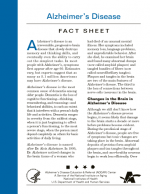In FY 2013, the Office of the NIH Director allocated additional funding to Alzheimer’s disease. That $40 million, along with $5 million in NIA funds, was awarded to test promising drugs aimed at preventing Alzheimer’s and to identify and validate biological targets for novel therapies. The studies are among the first to be developed in response to recommendations from the 2012 NIH Alzheimer’s Disease Research Summit: Path to Treatment and Prevention and reflect research goals in the National Plan.
The early-phase and prevention clinical trials will test treatments in symptom-free volunteers at risk for the disease, that is, those in the very earliest stages—timing that could increase the chances of delaying or halting disease progression. The trials are:
- Dominantly Inherited Alzheimer Network Trials Unit (DIAN-TU) Trial. Dr. Randall Bateman, Washington University, St. Louis, and co-investigators were awarded $1.5 million, with the potential for $6 million over 4 years, to investigate new anti-amyloid-beta drug treatments in volunteers who have an inherited form of Alzheimer’s disease. While early-onset Alzheimer’s is rare, the knowledge gained from this study will be highly relevant to both early- and late-onset forms of the disease. The multi-site international effort will test three anti-amyloid-beta interventions: gantenerumab, solanezumab, and a third, as yet undetermined, drug. This trial is also supported by the Alzheimer’s Association® and several private companies: Roche, Lilly, Avid Radiopharmaceuticals, and CogState. (NIA support: AG 042791-01A1)
- The Alzheimer’s Prevention Initiative APOE4 Trial. Drs. Eric Reiman and Pierre Tariot, Banner Alzheimer’s Institute, Phoenix, and co-investigators received $33.2 million for a 5-year, multi-site prevention trial testing an anti-amyloid drug in cognitively normal older volunteers. The volunteers are at increased risk of developing late-onset Alzheimer’s because they inherited two copies of the APOE ɛ4 allele, the best known genetic risk for late-onset disease. This randomized, controlled clinical trial will evaluate the efficacy of the amyloid therapy in preventing cognitive decline and will, through imaging and biomarker techniques, help identify faster ways to evaluate other promising prevention therapies. Also supported by private funding, the researchers plan to begin the trial in 2015. The test drug has not yet been selected. (NIA support: AG 046150-01)
- Allopregnanolone Regenerative Therapeutic for MCI/Alzheimer’s: Dose Finding Phase 1. Drs. Roberta Brinton and Lon Schneider, University of Southern California, Los Angeles, have been awarded $2.4 million to conduct a 12-week, early-phase clinical trial of the safety and tolerability of allopregnanolone, a natural brain steroid, in treating people with MCI or Alzheimer’s disease. The drug has been shown to promote the generation of new brain cells, reduce amyloid levels, and restore cognitive function in preclinical animal testing. NIA has supported Dr. Brinton’s work for several years, including with basic science grants to understand allopregnanolone’s mechanism of action in the brain, a drug development grant for optimal dose and formulation, and support for preclinical toxicology studies. (NIA support: AG 046148-01)
- Stimulating the Innate Immune System to Prevent Alzheimer’s. Dr. Ted Ashburn, Sanofi Aventis, Cambridge, Mass., in partnership with Baylor College of Medicine, Houston, received $2.2 million for a 3-year, Phase II proof-of-concept study of sargramostim, a drug that stimulates the innate immune system. The study will determine whether the drug clears abnormal deposits of amyloid before they cause damage and, as a result of this clearance, either prevents cognitive decline or improves cognition. This 24-week, randomized, double-blinded, placebo-controlled study will recruit people with MCI, a condition that often leads to Alzheimer’s. (NIA support: AG 046143-01)
Other awards will make possible studies focused on identifying and validating novel therapeutic targets for Alzheimer’s disease:
- Pathway Discovery, Validation, and Compound Identification for Alzheimer’s Disease. Dr. Philip De Jager, Brigham and Women’s Hospital, Broad Institute, Harvard University, Boston, and Dr. David Bennett, Rush University Medical Center, Chicago, were awarded $1.7 million, with the potential of $7.9 million over 5 years. Their study seeks to discover, characterize, and validate complex molecular networks and candidate genes that influence susceptibility to cognitive decline and Alzheimer’s disease. Using cutting-edge computational methods, the multi-disciplinary team will analyze rich clinical, pathological, genomic, and other large-scale molecular data collected from more than 1,000 volunteers from the Religious Orders Study and the Rush Memory and Aging Project. They hope to identify compounds that normalize the activity of dysfunctional features in molecular networks and to identify drugs for several novel therapeutic targets. To accelerate testing of promising therapies for future clinical trials, the investigators will focus on drugs that have already undergone Phase I testing in humans. (NIA support: AG 046152)
- Integrative Biology Approach to Complexity of Alzheimer’s Disease. Dr. Eric Schadt, Icahn School of Medicine at Mount Sinai, New York City, and a team of investigators received $1.6 million with the potential of $8.2 million over 5 years. This study will apply innovative analytical methods to large-scale molecular, cellular, and clinical data from Alzheimer’s patients to construct biological network models and gain new insights into the complex mechanisms of the disease. The team will also employ a computational approach to test whether any existing drugs currently used for other conditions are capable of modulating Alzheimer’s networks and could be repurposed for Alzheimer’s treatment or prevention. (NIA support: AG 046170-01)
- A Systems Approach to Targeting Innate Immunity in Alzheimer’s. Dr. Todd Golde, University of Florida, Gainesville, and colleagues received $1.6 million in FY 2013, with the potential of $7.7 million over 5 years, for a study building on evidence that the innate immune system, which provides immediate defense against infection, and brain inflammation have a significant role in Alzheimer’s disease. To identify and characterize novel therapeutic targets within the innate immune system, this study will use a systems biology approach to integrate genomic, gene expression, and pathological data from Alzheimer’s patients and Alzheimer’s mouse models and analyze them in novel ways. The team will test in animal models of the disease the validity and therapeutic potential of the key factors predicted by the analysis. This research has the potential to speed the discovery and testing of Alzheimer’s disease prevention and treatment therapies by targeting the immune system. (NIA support: AG 046139-01)

http://www.nia.nih.gov/alzheimers/publication/2012-2013-alzheimers-disease-progress-report/advancing-discovery-alzheimers









